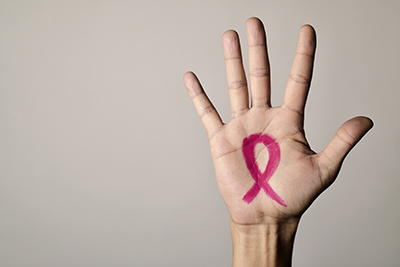By Mary Alice Keller

The oncogene MYCN regulates cancer cell growth, proliferation, metabolism, and survival; tumors with increased MYCN expression are more aggressive. MYCN usually occurs in neuroendocrine tumors but can also occur in tumors of the reproductive system, including the prostate and ovaries.
A Science Translational Medicine paper published earlier this year details new findings by a team led by Johanna Schafer, a researcher in the lab of Jennifer Pietenpol, Benjamin F. Byrd Jr. Chair in Oncology and professor of biochemistry, on the role of MYCN in Triple Negative Breast Cancer. A highly aggressive and treatment-resistant malignancy, TNBC affects predominantly younger women and, compared to other types of breast cancer, metastasizes more frequently and reduces survival times.
Although targeted therapies tailored to unique features of tumor biology exist for many types of breast cancer, clinicians currently have just one treatment to offer their patients with TNBC: cytotoxic chemotherapy, which prevents cell division and thereby precipitates cancer cell death. This type of chemo also kills healthy cells, however, leading to such side effects as hair loss, digestive complications, and extreme fatigue.
Motivated by the promise of therapeutics that are narrowly tailored to TNBC tumor biology to increase treatment efficacy and reduce side effects, the Pietenpol lab probed the role of MYCN. To do so, the researchers conducted a mix of in vivo and in vitro studies. First, the authors studied 344 TNBC tumors and confirmed that they expressed MYCN. To test the effect of MYCN gene expression levels on TNBC treatment response, the scientists used both cell line and patient-derived mouse models and treated them with two classes of drugs—BET inhibitors and MEK inhibitors. Preclinical studies have shown that BET inhibitors regulate the transcription of MYCN; MEK inhibitors regulate the stability of proteins in the MYC family, including MYCN, by inhibiting the MAPK pathway. They found that TNBC cells with higher MYCN expression were more sensitive to BET inhibitors and MEK inhibitors than those with lower expression of MYCN. Together, the inhibitors reduced the growth of the cancerous cells in the present study.
Schafer and colleagues determined that MYCN is often expressed in TNBC cells, and thus could be relevant for distinguishing TNBC tumors from other types of breast cancer. The authors propose that clinical development of combination BET and MEK treatments, as well as further evaluation of MYCN gene expression as a marker that could indicate which tumors are more responsive to those drugs, are important next steps in research.
This research was supported by the Incyte Corporation, the National Cancer Institute, and Susan G. Komen For the Cure.
"triple" - Google News
September 11, 2020 at 04:34AM
https://ift.tt/33hyu7R
Study explores the role of MYCN in Triple Negative Breast Cancer diagnosis and treatment - Vanderbilt University News
"triple" - Google News
https://ift.tt/3dc0blF
https://ift.tt/2WoIFUS
Bagikan Berita Ini














0 Response to "Study explores the role of MYCN in Triple Negative Breast Cancer diagnosis and treatment - Vanderbilt University News"
Post a Comment